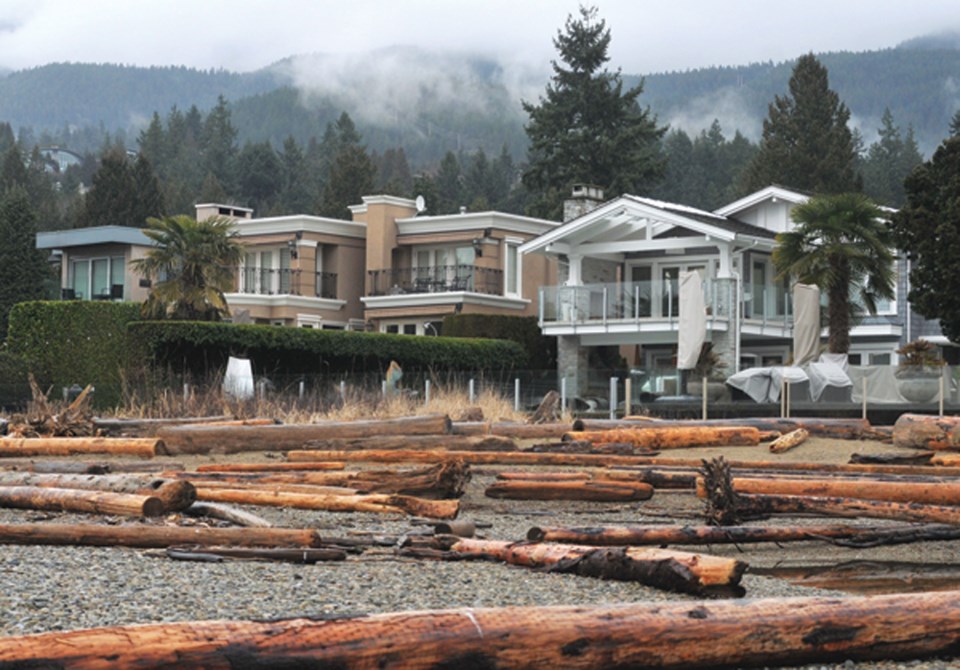The sea is rising and the District of West Vancouver is taking steps now to keep the waves from crashing into people’s bedrooms.
Council approved Tuesday night (March 29) a new development permit area that will raise the minimum height for new buildings on properties at risk of coastal flooding.
Since 2018, the province has required municipalities to incorporate a one-metre sea level rise by 2100 into their waterfront development rules. But sending every project to council – about 10 per year – for approval has been onerous for property owners and developers and the municipality, and the process didn’t include any environmental considerations.
There about 790 property owners whose lots are within the development permit area, most of them on the waterfront but there are a few in low-lying areas further back from the sea. The new permit will be required for new homes, subdivisions or major additions. The permit introduces rules as well for landscaping within 15 metres of the high tide mark, with an eye to maintaining natural habitat, ensuring slope stability, and keeping land-based pollutants from running off into the ocean.
Permits will be granted by staff but property owners will have a right to appeal to council.
In recent years, the notion of building up properties to keep them out of storm surge hazard has been unpopular with neighbours in existing homes who have voiced concerns about their yards being overshadowed, losses of privacy and potential drainage problems.
After a year and a half of public consultations, there were only a handful of residents who called in to speak to a public hearing on the matter March 29. No one was outright opposed to the new development permit area, although one property owner questioned whether there would be costly unintended consequences for homeowners.
“I do believe, and I have seen when properties are subject to new restrictions, there can be an apparent devaluation of property, especially if it becomes a bit of an issue and people are demanding or complaining and talking to appraisers,” said Michael Thornton, who added it could pose a risk to the municipality’s tax base.
Planning director Jim Bailey said the intent of the policy is to do the opposite.
“The risk of the value deteriorating isn't necessarily from us imposing regulations that are looking to mitigate against the risk. It's more that those properties are subject to coastal flooding,” he said. “We're trying to do something to maintain the values of the house. The whole goal here is to allow people to develop, but to do so in a way that protects their house so that they can keep the homes where they are.”
Coun. Sharon Thompson cast the lone vote against the new development permit. Thompson said she doesn’t deny the threat of climate change, but she wished the district were taking a more gradual approach.
“This policy has all good intentions around the environment around protecting our residents,” she said. “But my fundamental concern about this policy has always been that we are reaching too far and creating an unfair burden on our current property owners, and by that I mean trying to achieve this 100-year standard or more.”
The rest of council strongly disagreed.
“The sea is going to rise by up to a metre in the next 80 years, and climate change is here,” said Coun. Nora Gambioli. “It is a scary proposition for all of us, and especially for waterfront property owners. This DPA will help us to help them build safe structures, and to protect the natural foreshore and to protect it for public use and that is our job.”
Watering down the requirements of the development permit area would only result in legal liability for the municipality, Coun. Craig Cameron warned, especially when the inevitable happens.
“That is simply not a risk that any prudent government could or should take,” he said. “Going slow is just absolutely not an option. I think we need to embrace the notion that no amount of denial is going to stop climate change, and we either get with the program and we plan for it, or we suffer the consequences.”
Mayor Mary-Ann Booth rattled off a recent list of devastating, deadly and costly disasters flowing from a warming climate, and also addressed the question in the big picture.
“We all would wish the world was going in a different direction, and I know it causes anxiety, uncertainty and fear. But we are resilient, and we've showed that on many occasions and in the context of climate change, resilience means avoiding the unmanageable and managing the unavoidable,” she said.
The municipality will review the policy a year after implementation begins, looking to iron out any problems.



